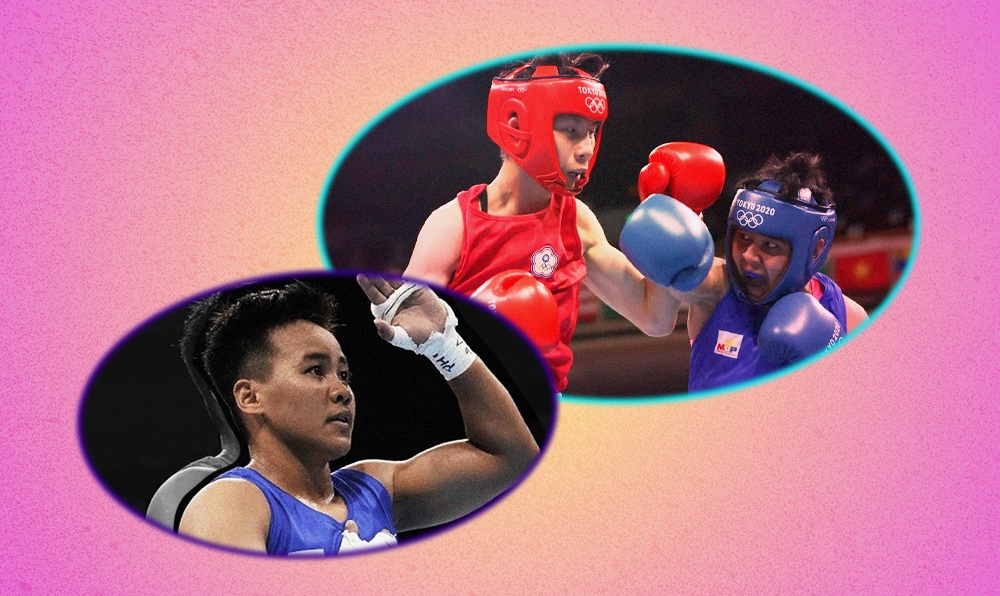After Margielyn Didal won 7th place in skateboarding and Hidilyn Diaz won her historic gold medal at the Olympics on July 26, another Filipina competing in a male-dominated Olympic sport made the nation proud today. This time, it’s Nesthy Petecio, who, after beating Colombia’s Yeni Arias Castaneda in an unanimous decision, has currently secured a bronze medal for boxing and is on track to win gold. Yes, you read that right: gold. While we’re already assured of bringing home multiple medals for the first time since 1932, this may be the first time we’re getting multiple gold medals ever.
To quote Greta Gerwig’s “Little Women”: “Women. Sigh.”
It’s not lost on us that women are taking over the Olympic narratives this year. We’ve listed down before all the historic firsts that happened: our wins, Naomi Osaka being the first tennis player to light the Olympic torch, and so on. Bermuda also won their first ever gold medal, and also because of a female player: Flora Duffy for women’s triathlon.
Bringing it back to Petecio: Aside from securing the bronze medal and possibly getting gold, her win is the “first podium finish for Philippine boxing since Onyok Velasco grabbed a silver in Atlanta in 1996,” according to Inquirer.
What makes this so special is that women’s sports have been ignored and demeaned for the longest time.
Soccer player Megan Rapinoe said as much earlier this year when she defended trans athletes’ right to play. “As a woman who has played sports my whole life, I know that the threats to women’s and girls’ sports are lack of funding, resources and media coverage; sexual harassment; and unequal pay,” she wrote in a Washington Post op-ed.
While she was talking about the U.S., this unfortunately is a pretty universal experience. Women’s sports tends to be extremely underfunded, especially compared to their men’s alternative, even when the women’s team outperforms the men’s. The U.S. women’s national team sued their federation in 2019 exactly because of that. And the media barely ever covers them. In 2012, the Women’s Sport and Fitness Foundation in the U.K. publicly stated that women’s sport was being sidelined in sports coverage and urged the government to find more media and commercial partners for women’s sports.
And in the Philippines, where funding and support for athletes is itself already scarce (except for maybe the popular sports), this echoes even more. In 2018, Diaz posted on Twitter a picture of a threadbare gym with old and rusty equipment, writing, “Nagtataka pa ba tayo bakit hanggang ngayon wala pa tayong gold medal sa Olympics? Sabi ni coach [noong] 1990 pagpunta niya dito sa Manila ganito na ang gym hanggang ngayon ganito parin.” The first reply that pops up? “Demanding ka na ngayon, Hidilyn.”
Nagtataka pa ba tayo bakit hanggang ngayon wala pa tayong Gold medal sa Olympics? Sabi ni coach 1990 pagpunta niya dito sa manila ganito na ang gym hanggang ngayon ganito parin. 😑 pic.twitter.com/RU2gtqDGkb
— Hidilyn Diaz OLY (@diaz_hidilyn) January 10, 2018
So it feels extremely cathartic to see all these women performing so well this year. Angela Natividad, writer and former captain of the Ateneo de Manila University women’s softball team, told Preen, “Women in sports have been underfunded for years, especially here in the Philippines, and to see one break records and earn the love and respect of not just a nation but the entire world in the Olympics is just moving.”
Hidilyn Diaz and Nesthy Petecio both competing in male dominated sports and winning Olympic medals—if you’re not screaming “ABANTE, BABAE” at the top of your lungs idk what to do with you
— Preen.ph (@preenph) July 28, 2021
Someone replied to our tweet about Diaz and Petecio with, “They are fighting in women’s division. And men from other countries are winning. So what’s the point?” But the point is that this is our first Olympic gold ever, and our first multiple medals since 1937, and they’re both with women. Of course men are still winning at the Olympics; no one’s saying they aren’t. But these Filipinas’ achievements are symbolic, especially because they won through their own efforts with the odds stacked against them; again, they’ve received little to no assistance from their country. Diaz, for one, ended up training in Malaysia, even if it meant being apart from her family. “Sobrang thankful ako sa private sectors na tumulong sa akin like last year na akala namin hindi namin ma-survive ang stay namin sa Malaysia,” she said.
I want to believe that this isn’t just one moment, but an entire movement for women’s sports. I want to look back on this year not as “the summer that women took over the Olympics,” which is how it’s starting to be written as already, but as “the summer where everyone started taking women’s sports seriously and took a good look at why it took so long.”
Art by Pammy Orlina
Follow Preen on Facebook, Instagram, Twitter, YouTube and Viber


